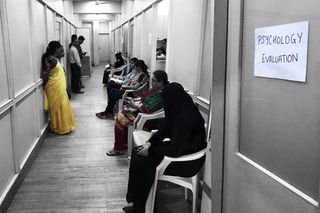
Mumbai‑Based Mental Health Professionals Combat Stigma, Misinformation By Offering Discounted Services
Practitioners say Indians who can afford mental health care know it can help — but preconceived notions keep them from investing at full price.

India’s serious mental health problems are no cloaked malady, and the stigma associated with seeking help shows little sign of dying down. Often this stigma and low awareness bleed into how much value a person can afford to place on mental health care, whether by choice or due to external circumstances. Some parts of the population simply cannot afford mental health care and lack enough awareness to want or value it. Other people can afford mental health care, but do not understand the value of investing in it for themselves or for those dependent upon them. Finally, still others understand the value of mental health care and would like to afford it, but cannot because they are financially dependent or make too little to be able to set aside money for mental health care.
This is why some mental health practitioners— clinicians and therapists — offer heavily discounted, or free mental health help. This is carried out in order to build awareness of mental illnesses, their treatments, and help those who are financially unable to cover the steep costs of psychotherapy and psychiatric consultations.
“Essentially, we don’t want to say no to anybody who comes,” Dr. Syeda Ruksheda, a psychiatrist associated with Invisible Illness, a Mumbai-based organization dedicated to destigmatizing mental health and providing affordable mental health care, says. Invisible Illness’ free mental health camps currently run out of a Mumbai Rotary Club building. Apart from free screenings and consultations provided at these camps, Invisible Illness charges only Rs. 500 per session for therapy and Rs. 500 to Rs. 700 for a psychiatrist consultation. This rate is also often reduced to Rs. 200 to further assist those who cannot afford the already discounted rates. In comparison, Dr. Ruksheda states that visiting a psychiatrist’s private practice would cost anything from Rs. 1500 to Rs. 2000.
Related on The Swaddle:
We Need to Reframe Mental Health as a Social Justice Issue, Not a Personal Problem
The demographic of attendees at one of Invisible Illness’ camps do not fit the idea of economic disadvantage; they consist of mostly young individuals — the newly employed, college students, interns, and students living away from home, often from relatively affluent backgrounds. Dr. Ruksheda, however, says this is the norm at all the camps they’ve conducted. This is because even affluent young people in India often do not receive access to mental health, as their parents do not deem it necessary. “Why are they coming here and why can’t they afford private care? It’s not because they’re kanjoos [miserly] — it is because they have to take it out of their pocket money.”
Dr. Ruksheda says free/discounted services can help people understand their struggles, but the stigma that limits financial investment in mental health also makes it harder for a psychiatrist to treat patients who can only show up to a limited or irregular number of sessions. “I have cases where people come to my private practice … and say ‘I have only money for these many sessions,’ and I’m supposed to magically wave my wand and fix them.”
To diversify the demographic of individuals treated and reach people who are more economically disadvantaged, mental health caregivers have to put in extra effort, often resulting in limited wins. Jasdeep Mago, a psychologist and the co-founder of Invisible Illness, says the team went on awareness drives to slum settlements to speak to people and distribute pamphlets, but not one person showed up to the camp from any of those settlements. Mago believes a possible reason for this lack of response is due to the pre-existing stigma attached to mental illness. “And that’s okay — we know that it takes time … Eventually, they will come. It may not be today, tomorrow, or even a year later, but they will come,” she said.
Related on The Swaddle:
It’s Time for a More Humane Approach to Mental Health Care
Mago and Dr. Ruksheda insist that individuals seeking out mental health care choose a licensed and qualified practitioner to impart knowledge, rather than trust unreliable online sources, or life coaches. Dr. Ruksheda stresses that “therapy is a structured professional skill-based intervention, which is an important part of treatment. People get disheartened after one year of life coaching, thinking, ‘I’ve been doing this for a year and it hasn’t helped, so how will therapy? Therapy doesn’t work!’ And I say, ‘Dude, have you ever taken therapy?’ But how would they know — there isn’t enough awareness to tell the two apart.”
Apart from life-coaches, influencers who often share mental health awareness content may not always get it right. Dr. Ruksheda adds, “I’m a strong believer in tech and social media and the positive implications they have, but I believe there’s a strong lack of personal integrity out there. If I were an influencer or a blogger, I’d want more eyeballs. I may or may not be very ethical about whether the research I’m quoting is real or fake news. I may be full of integrity, but I might still think fake news is news.”
While taking online information with a pinch of salt is helpful, Dr. Ruksheda doesn’t disavow the internet’s potential to help. She adds, “There are mental health issues and there are mental health disorders. For mental health issues, if self-help behaviors are working for you, that’s also great. Not everybody has to come running to a psychiatrist or psychotherapist. [But] for mental health disorders, please seek professional help and do not just rely on internet advice, because professional help reduces disease, distress and actually makes better outcomes happen.”
Providing discounted care is an altruistic endeavor that practitioners actively want to take up, but they must often grapple with the dilemma of whether to pay their bills or to provide discounted or free care. “There’s no pressure to be altruistic from one’s peers in the mental health care industry, but there is certain social pressure to help people due to our profession,” said Mago. Societal pressure to share one’s expertise and aid for free is also societal acknowledgment of its value. While the economically disadvantaged genuinely cannot afford regular mental health care, those who can afford it do not do so even while knowing, at a certain level, that mental health care can help. Since mental health struggles do not always manifest as a visible virulence and thus are not taken as seriously, a lot of clients treat mental health care like any other service that one can bargain for — asking their mental health care providers for deals and discounts evenwhen they are in the financial position to pay full price.
“It would be hypocritical of us if we don’t take care of ourselves because we take care of others. Itis precisely what we try to teach our clients and patients: if you’re not okay, you’re not gonna be able to take care of others. First, wear your seatbelt, and then help the other person,” said Dr. Ruksheda. She volunteers 10 hours of her time each week to three different outpatient clinics (OPDs), and Mago initially volunteered six hours daily at Invisible Illness till they roped in more psychologists to meet the demand.
“Job satisfaction will also come from how much I earn and how much I can value my services based on my fee. … If that’s not working for me, I’m not going to want to volunteer those 10 hours,” Dr. Ruksheda said. “There should be a space for both full-price and discounted/free mental health care … People who have paid crores for their education have the right to charge whatever they want,” adds Mago.
Aditi Murti is a culture writer at The Swaddle. Previously, she worked as a freelance journalist focused on gender and cities. Find her on social media @aditimurti.
Related


How Much Sleep Do You Really Need?
